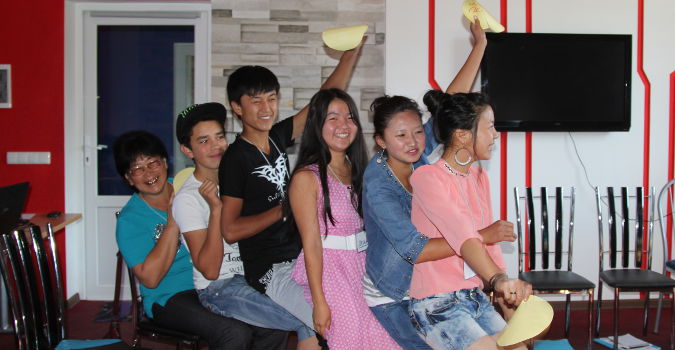Peace and security and engendering humanitarian action

Over the last decade, Central Asian countries have experienced escalated cross-border tensions, violent conflicts and difficult socio-economic challenges. The on-going Afghanistan situation has a spill-over effect in neighbouring Tajikistan, Turkmenistan and Uzbekistan. A border dispute between Kyrgyzstan and Tajikistan continues, creating tension and causing sporadic violence.
These conflicts and crises have devastating consequences and often exacerbate gender inequality between women and men. Aside from being targeted through war tactics, such as sexual violence, women and children make up the majority of refugees and internally displaced persons.
Using gender-based approaches is critical in addressing women and children’s needs. As widely recognized by the international community, women’s participation is vital to sustainable peace, yet they are often excluded from negotiation, reconciliation and reconstruction processes.
UN Women’s programmes are guided by a series of commitments to women’s rights. These include UN Security Council Resolution 1325 (UNSCR 1325) and six supporting resolutions – 1820, 1888, 1889, 1960, 2106 and 2122. Other key reference documents are the Beijing Platform for Action and the Convention on the Elimination of All Forms of Discrimination against Women (CEDAW).
UN Women in Kyrgyzstan, in partnership with other UN agencies, works with governments, women networks and human rights organizations to:
- support projects that increase women’s active participation and decision-making in conflict prevention and resolution
- integrate women’s needs in post-conflict recovery programmes
- increase women’s leadership in peace, security and humanitarian responses
- promote implementation of UN Security Council Resolutions on Women, Peace and Security
- strengthen the protection of women affected by crisis or conflict.
UN Women in action in Kyrgyzstan
- Supported the development and on-going implementation of Kyrgyzstan’s National Action Plan (NAP) on UNSCR 1325. The NAP establishes an institutional framework to protect women and girls’ rights in conflict prevention activities, enhances women’s role in the security and defence sector, and confirms zero tolerance of violence against women and girls in conflict situations.
- The Promoting Gender Justice and Empowerment of Young Women project is providing 8,000 to 10,000 youth activists with gender equality and women’s rights advocacy skills so they can promote the rule of law and monitor police and justice sector implementation of gender justice laws.
- Organizing gender equality advocacy initiatives so 8,000 to 10,000 young people in 50 schools in four of the country’s seven provinces can monitor the application of laws to protect young women, and report human rights violations like bride-kidnapping and underage or unregistered marriages.
- The Building a Constituency for Peace project is:
- training rural girls and boys in 33 pilot schools to identify income-generating activities and give them innovative life skills as an alternative to labour migration and criminal activity;
- teaching human rights, gender, the rule of law and leadership skills to 300 peer educators and 3,000 secondary school students in 61 schools in 24 out of Kyrgyzstan’s 40 districts;
- using local government, state bodies and civil society to reduce divisions and local tensions.